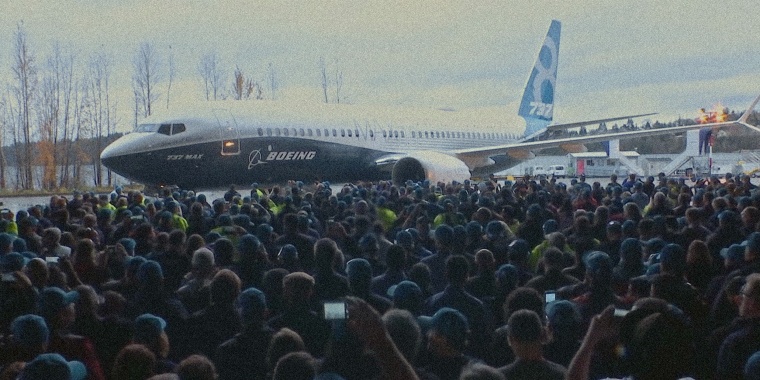On Oct. 29, 2018, 13 minutes after Lion Air Flight 610 departed Jakarta, Indonesia, the Boeing 737 MAX aircraft dove nose down into the Java Sea, killing all 189 people on board. According to the flight’s data recorder, the plane had inexplicably moved up and down over 24 times before finally diving at full speed into the sea. Dennis Muilenburg, then the CEO of Boeing, appeared on the Fox Business a month later and said, “The bottom line here is the 737 MAX is safe and safety is a core value for us at Boeing.”
These two crashes are just the beginning of a tale of corporate greed and our two-tiered justice system.
But in March 2019, it happened again. Another Boeing 737 MAX crashed, killing the 157 people on board, who hailed from 35 nations. In that crash, Ethiopian Airlines Flight 302 took off from Addis Ababa, Ethiopia and, six minutes after take-off, dove into a field flying at full speed.
These two crashes of the same model Boeing aircraft are just the beginning of a tale of corporate greed and our two-tiered justice system captured in the riveting new Netflix documentary “Downfall: The Case Against Boeing,” directed by the award-winning filmmaker Rory Kennedy.
As we learn in the film, both crashes were caused by a faulty sensor on the aircraft triggering the Maneuvering Characteristics Augmentation System (MCAS), aircraft software that Boeing installed to help pilots keep the aircraft from stalling. However, Boeing didn’t tell airlines or pilots about MCAS. In fact, MCAS was not even mentioned in the pilot manual. The faulty sensors wrongly alerted the MCAS system that the planes were in danger of stalling, causing the nose of the aircraft to point downward and leaving the pilots powerless to stop the dive.
The two crashes led to the worldwide grounding of that Boeing aircraft for nearly two years. During that time, an 18-month congressional inquiry led by Rep. Peter DeFazio, D-Ore., found a “culture of concealment” wherein “Boeing withheld crucial information from the FAA, its customers, and 737 MAX pilots.” In a statement from September 2020, DeFazio said the committee had reached the damning conclusion that “Boeing — under pressure to compete with Airbus and deliver profits for Wall Street — escaped scrutiny from the FAA, withheld critical information from pilots, and ultimately put planes into service that killed 346 innocent people.”
Kennedy, daughter of Robert F. Kennedy, said in a recent interview on my SiriusXM show that Boeing had been a storied company that helped President John F. Kennedy (her uncle) make good on his promise to put a man on the moon. But flash-forward to more recent times. As DeFazio’s report noted, Boeing faced “production pressures that jeopardized the safety of the flying public” and specifically cited “extensive efforts to cut costs, maintain the 737 MAX program schedule, and avoid slowing the 737 MAX production line.”
As DeFazio detailed in the congressional hearings and as Kennedy powerfully depicts in her film, a glaring and deadly example is Boeing not telling airlines about the 737 Max’s MCAS system since this new navigation system would require additional costs to train pilots and in turn could make airlines less likely to buy them. This investigation did lead to the passage of the Aircraft Certification, Safety, and Accountability Act, which DeFazio described as necessary to “make sure what happened with the Boeing 737 MAX is never repeated.”
Boeing reached a settlement with the DOJ that, for many, did not deliver anything close to accountability.
These crashes also triggered a Department of Justice investigation into Boeing. At its conclusion in early 2021, the DOJ’s acting assistant attorney general said, “Boeing’s employees chose the path of profit over candor by concealing material information from the FAA concerning the operation of its 737 Max airplane and engaging in an effort to cover up their deception.”
In the closing days of the Trump administration, Boeing reached a settlement with the DOJ that, for many, did not deliver anything close to accountability. The Justice Department agreed to not prosecute the company, and Boeing agreed to pay $2.5 billion in penalties and compensation. While that might sound like a big number, it’s only 4 percent of the $62 billion in total revenue Boeing made in 2021.
When this settlement was announced, DeFazio rightfully slammed it as a “slap on the wrist” and “an insult to the 346 victims who died as a result of corporate greed.” DeFazio added in a statement at the time that by the terms of this settlement “senior management and the Boeing board were not held to account.” The Oregon congressman went on to state poignantly that “from where I sit this attempt to change corporate behavior is pathetic and will do little to deter criminal behavior going forward.”
Beyond that, the families of those who died in the two crashes say they were not even consulted before DOJ settled with Boeing, prompting 15 of them to file a federal lawsuit in December seeking to revoke the company’s protection from further prosecution.
To date, one lower-level Boeing employee — a former pilot — was criminally charged for providing “materially false, inaccurate and incomplete information” to the FAA about Boeing’s MCAS system. According to the DOJ, he was “scheming to defraud Boeing’s U.S.‑based airline customers to obtain tens of millions of dollars for Boeing.”
While Muilenburg was fired as CEO of Boeing in December 2019, he left with more than $60 million in pension benefits and stocks. Boeing stock, which was at a low of $95 a share in early 2020, was trading Friday at over $200 a share.
There’s no escaping that there’s a different sets of rules when it comes to our (in)justice system: one for the wealthy and powerful and another for the rest of us. And the longer that injustice continues, the more likely it is we see future cases of corporate greed that translate into death.

